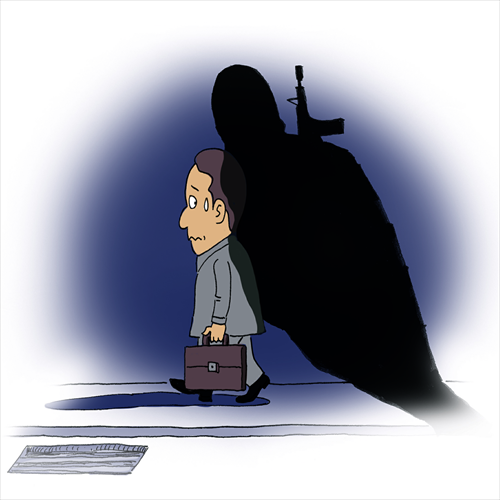China walks careful line on anti-terrorism

Illustration: Liu Rui/GT
The Islamic State (IS) terrorist group claimed it had killed two hostages, one from China and the other from Norway. The news was disclosed by the notorious group in its English language online magazine Dabiq on Wednesday.
In September, the propaganda magazine posted pictures of both victims and said they were "for sale." The Chinese citizen was identified as Fan Jinghui, a man from Beijing and a veteran "wanderer" in the Middle East.
Chinese President Xi Jinping "strongly condemned" the barbarous action.
Chinese spokesperson for the Foreign Ministry Hong Lei said he was "shocked" by the brutal killing.
As for international analysts and observers, the suspense over the repercussions of the killing is whether this could be a turning point for China's anti-terrorism policy, and whether China will reconsider a shift in anti-terrorism after the focal incident.
The killing of the Chinese citizen could serve as an impetus for China to accelerate the recalibration of its anti-terrorism policies, but it won't herald a dramatic change. China has a duty to protect its citizens and national interest from dangers and threats overseas, but the foothold of no military interference will not be easily abandoned.
But this is a landmark incident that might push the Chinese government to make more contributions to anti-terrorism efforts. China will pay an increasing amount of attention as its enterprises and citizens are more deeply engaged in the international community, especially along the path of "One Belt, One Road," which will go across many unstable regions.
Military actions alone can be tricky in fighting terrorism. US actions in the Middle East in the past decade have proven that military intervention might not lead to results as expected. China will employ measures to protect its citizens and national interest overseas in a low-profile and less provocative manner, such as putting more efforts to encourage and fund security companies to serve corporations that have overseas business. It cannot risk its entire national interest through military engagement in the war on terror like the US or Russia.
Every Chinese move in the Middle East may trigger contrasting responses. China is often depicted by Western media as having ulterior motives if it wants to play a more active role in regional affairs.
However, when China chooses not to involve in certain issues, it will also be blamed for failing its responsibility as a global power.
This double-standard attitude has always been prevalent, and President Xi stated in the just concluded G20 summit that double standards must be dropped to fight terrorism.
Therefore, China needs to walk a fine line in playing a constructive role in regional and international affairs such as anti-terrorism. It cannot fall into the trap set up by the West to transfer the conflicts, at least part of them, between the West and the Muslim world to China.
China should stick to its own anti-terrorism strategies, and it needs to have a say in integrated actions with other countries to fight terrorism.
The author is an associate professor at the School of Public Administration and Policy, Renmin University of China. opinion@globaltimes.com.cn